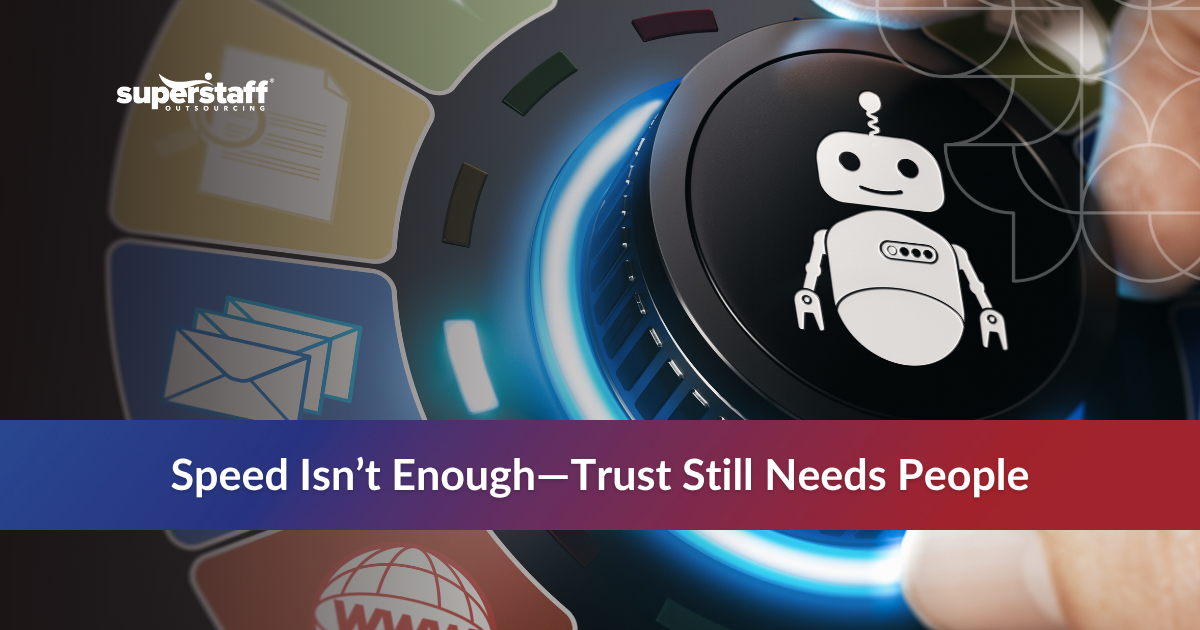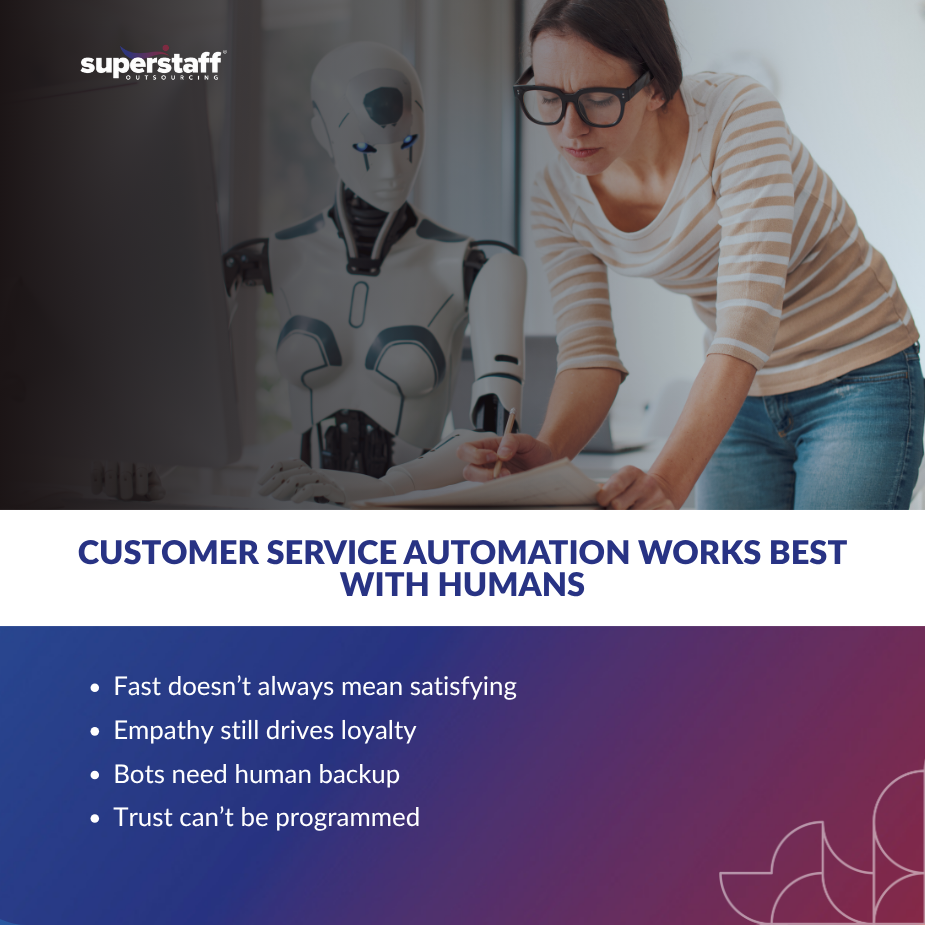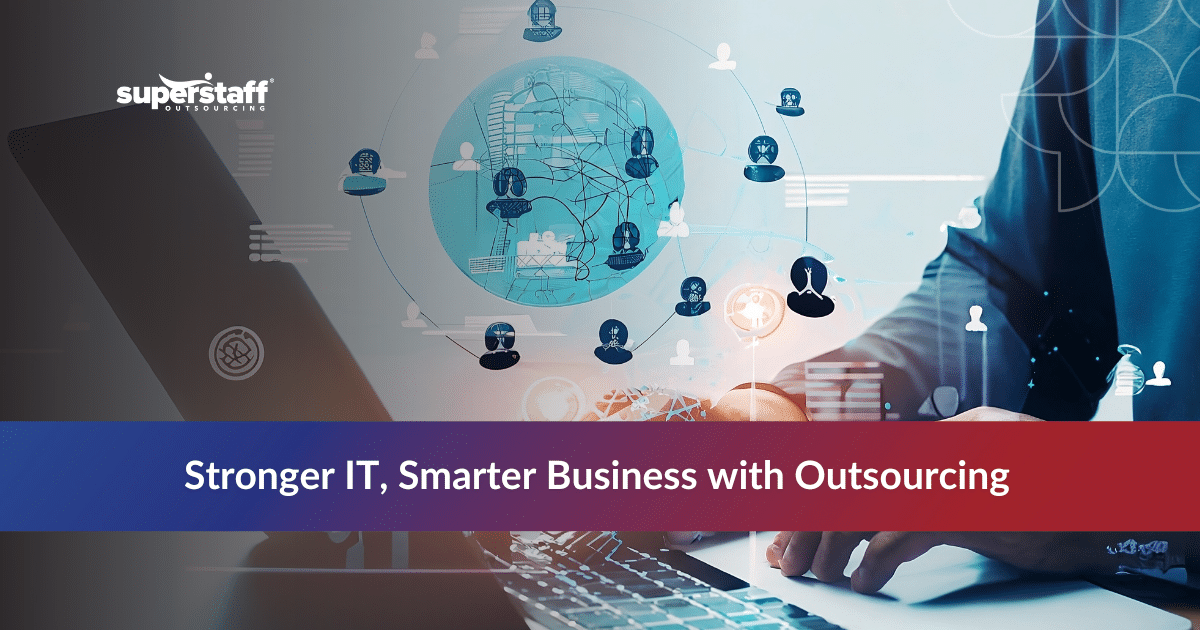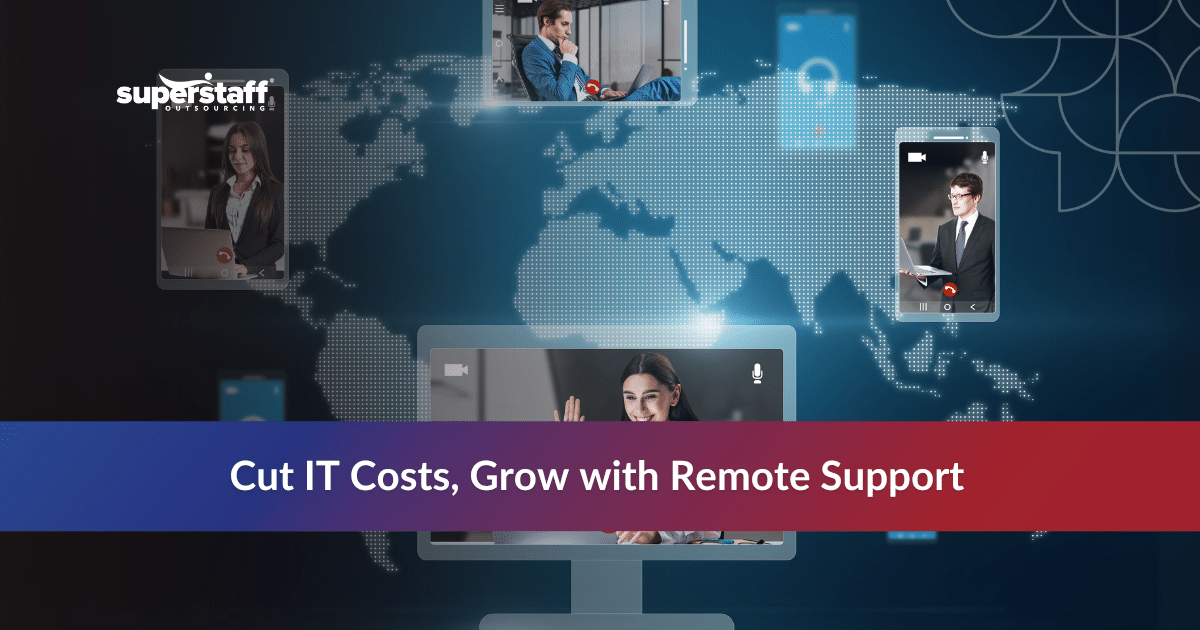
Automation is faster than ever—but are customers really more satisfied?
There’s no denying the impact of AI and bots in today’s customer support ecosystem. From chatbots that deliver instant replies to AI-driven ticketing systems that sort queries in milliseconds, customer service automation has reshaped how companies handle support. But even as speed and efficiency improve, one crucial element is often left behind: the human connection. High-resolution rates don’t necessarily translate to customer loyalty or trust.
The reality is that while automation reduces the load, it doesn’t replace the need for empathy, nuanced judgment, or real conversations. This blog dives into why the future of customer service isn’t just digital—it’s human-centered, and why outsourcing partners like SuperStaff help brands strike the perfect balance.
Automation Can Streamline Support, But It Can’t Solve Everything
Let’s start with what customer service automation does well. When someone needs to reset a password, track a package, or find an FAQ, automation shines. It offers a fast, frictionless way to resolve simple issues. For high-volume businesses, these efficiencies are a lifeline, keeping service queues short and response times fast.
But not all customer interactions fit neatly into a script. When a customer is dealing with a billing dispute, a defective product, or a frustrating technical error, canned responses only go so far. Chatbots can recognize keywords, but they struggle with context, emotion, and exception handling. A bot may offer five ways to troubleshoot, but none may match the customer’s specific issue—leaving them stuck in a loop of impersonal replies.
Here’s where things often go off the rails. Customers facing more complex problems quickly become frustrated when they can’t reach a human. Worse, if automation is used as a shield to avoid real engagement, customers perceive the brand as cold or indifferent. These moments erode trust, no matter how many tickets are technically “resolved.”
To understand why this happens, we have to look beyond metrics and ask what customers really expect from their interactions.
Customers Want Fast Answers, But They Also Crave Empathy and Connection

We live in an era where immediacy is expected—but not at the cost of compassion. Customer service automation may deliver speed, but satisfaction often hinges on something less tangible: the feeling of being understood.
Customers remember how they were treated during a crisis, a return, or a product complaint. A sincere “I’m sorry” from a human agent, delivered with warmth and clarity, can diffuse tension in ways a chatbot simply can’t. These moments create emotional resonance, the kind that fosters loyalty.
In fact, as we look toward customer service trends 2025, we see a clear pattern: brands investing in human-centric service alongside automation outperform those that lean too hard on bots. Customers don’t just want solutions—they want solutions with soul.
That’s because tone, empathy, and active listening aren’t just “soft skills.” They’re revenue drivers. When customers feel heard, they’re more likely to return, recommend, and forgive. This is especially true in industries like healthcare, finance, or travel, where high-stakes interactions require delicacy and discretion.
Yes, customers expect speed. But more than that, they want to feel like someone is actually on their side.
So, how can companies meet both expectations without sacrificing efficiency? The answer lies in integration—not substitution.
The Most Effective Support Strategies Integrate Automation With Skilled Human Agents
It’s not about choosing between bots and people. It’s about designing a strategy where each plays to its strengths. Customer service automation is great at gathering information, tagging tickets, routing requests, and handling high-frequency queries. This frees up human agents to focus on the conversations that matter most.
When a customer escalates an issue, it’s usually because they couldn’t find what they needed through automated channels. That’s the moment when the human touch becomes critical. Skilled agents can assess tone, context, and history to provide a resolution that’s not just accurate but reassuring.
This is where outsourcing partners like SuperStaff come in. With trained CX teams ready to support clients across time zones, industries, and platforms, SuperStaff helps businesses design hybrid service models that scale without compromising on quality.
Outsourced agents act as the second layer of defense—but more importantly, they’re the layer that builds the relationship. They help with brand-sensitive interactions, VIP escalations, retention efforts, and any moment that requires discretion or emotional intelligence. This model preserves the best parts of customer service automation while reinforcing its shortcomings with human strength.
But what happens when businesses rely too much on automation without that human reinforcement?
Over-Automating Customer Service Can Damage Trust and Brand Reputation
As companies rush to adopt the latest tech, it’s easy to fall into the trap of over-automation. After all, automation promises lower costs, round-the-clock availability, and data-driven insights. But if not implemented carefully, it can backfire.
Customers are savvy. They know when they’re talking to a script—and they resent being trapped in endless loops with no escape. When they reach out for help and only get robotic replies, the message is clear: This brand doesn’t care enough to talk to me.
Without human fallback, customer service automation can actually increase churn, not reduce it. Instead of solving the issue, it becomes another layer of friction. Frustrated customers often turn to social media to vent, leaving public evidence of poor service experiences. In many cases, those viral complaints stem not from the issue itself—but from how the issue was handled.
The brand damage can be significant. Customers who feel ignored don’t just leave—they discourage others from engaging. This is why trust, once lost, is so hard to rebuild.
We’re not arguing against automation. We’re saying automation alone isn’t enough.
Outsourcing Empowers Businesses to Deliver Both Speed and Humanity
What if you didn’t have to choose between efficiency and empathy? That’s the promise of working with a strategic outsourcing partner. By integrating customer service automation with highly trained offshore teams, businesses can create responsive, resilient, and relationship-driven support systems.
BPO providers like SuperStaff specialize in blending technology and talent. Our agents are trained not just in scripts, but in brand voice, emotional intelligence, and problem-solving. We don’t just answer questions—we represent your company’s values in every conversation.
More importantly, outsourcing allows for 24/7 coverage without burning out your internal teams. When automation handles volume and outsourced agents handle nuance, you get a seamless system that scales with demand.
This model also reduces the risk of inconsistent service. Custom workflows ensure that escalations happen smoothly, with clear protocols for when and how a bot hands off to a human. Instead of replacing agents, automation becomes a force multiplier—making each conversation faster, smarter, and more personalized.
When done right, outsourcing doesn’t feel outsourced at all. It feels like trust.
Customer Service Automation: The Right Balance Builds Loyalty
There’s no denying the role of technology in reshaping customer expectations. As we continue tracking customer service trends 2025, it’s clear that businesses embracing automation will remain competitive—but only if they don’t forget what makes service truly excellent.
Customer service automation solves the issue of speed, but it can’t build trust on its own. Empathy, creative problem-solving, and relationship-building still rely on the human touch. That’s where outsourcing becomes essential—not as a cost-cutting tactic, but as a strategic way to humanize your brand at scale.
And when businesses get it right? Customers don’t just stay—they advocate.
If you’re ready to move beyond transactional support and start building long-term customer loyalty, SuperStaff is ready to help. We’ll work with you to build a support system that blends cutting-edge automation with people who genuinely care.
Partner with SuperStaff to build a customer service strategy that doesn’t just deflect tickets—but earns trust.






